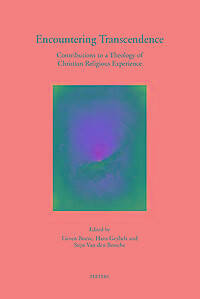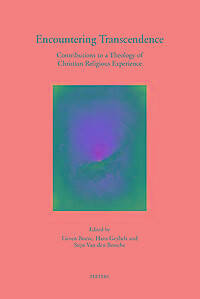
En raison d'une grêve chez bpost, votre commande pourrait être retardée. Vous avez besoin d’un livre rapidement ? Nos magasins vous accueillent à bras ouverts !
- Retrait gratuit dans votre magasin Club
- 7.000.000 titres dans notre catalogue
- Payer en toute sécurité
- Toujours un magasin près de chez vous
En raison de la grêve chez bpost, votre commande pourrait être retardée. Vous avez besoin d’un livre rapidement ? Nos magasins vous accueillent à bras ouverts !
- Retrait gratuit dans votre magasin Club
- 7.000.0000 titres dans notre catalogue
- Payer en toute sécurité
- Toujours un magasin près de chez vous
Encountering Transcendence
Contributions to a Theology of Christian Religious Experience
Geybels H. Boeve L., Van den Bossche S.
45,00 €
+ 90 points
Description
This volume consists of several contributions to a refined understanding of religious experience in view of contemporary theological epistemology. Diverse sample studies taken from the extensive field of religion, theology and religious studies reveal that 'religious experience' is today clearly a pivotal issue. More specifically, this is made evident in modern theological hermeneutics and in the anti-modern and/or post-modern reactions thereto, the theology of world religions and inter-religious dialogue, the contemporary resurgence of religiosity in Western society and culture, and the so-called turn to religion in contemporary continental philosophy. It would appear from such studies that the category of 'religious experience' is frequently called upon to clarify or explain the phenomenon of religion and religiosity on the one hand and to support and legitimise religious positions or the critique thereof on the other. Because of the loss of plausibility of tradition-bound religiosity and of foundational, so-called onto-theological schemes, 'religious experience' has come to constitute, for many, the last (or latest) point of departure and anchor for religion and religious thinking. This is certainly the case with respect to tendencies within contemporary Christian traditions and theological reflection. In a multitude of ways and from a variety of different perspectives, 'religious experience' and 'experience of transcendence' or 'of the divine' have gained a prominent place in philosophical and fundamental-theological conceptual schemes. In reaction to this, other authors have denied the very primacy given to religious experience in reflecting upon faith, pointing to the constitutive role of tradition and narrative without which there is no religious experience. From all this follows that the category of religious experience is in great need of reconceptualisation, not least from a theological point of view. On the one hand, religious experience is all too easily called upon to legitimise religious claims (often against 'tradition') and on the other hand, the category has become misleading in so far as it is tainted by the modern scientific understanding of experience - in reaction to which 'tradition' is then easily invoked to protect the core of religion. Both young scholars at the preceding junior conference and senior scholars during the conference's paper sessions presented from diverse perspectives new ways to conceive of religious experience in view of today's challenges of secularisation, religious plurality, the aestheticisation of religion, etc. The selected contributions have been arranged in four thematically oriented parts: 'Approaching Religious Experience in a Postmodern Age', 'Modern (re)Thinking of Religious Experience', 'Liberating Religious Experience', and 'Challenges for Spirituality'.
Spécifications
Parties prenantes
- Auteur(s) :
- Editeur:
Contenu
- Nombre de pages :
- 488
- Langue:
- Anglais
- Collection :
- Tome:
- n° 53
Caractéristiques
- EAN:
- 9789042916746
- Date de parution :
- 04-11-05
- Format:
- Livre broché
- Format numérique:
- Trade paperback (VS)
- Dimensions :
- 157 mm x 239 mm
- Poids :
- 793 g

Les avis
Nous publions uniquement les avis qui respectent les conditions requises. Consultez nos conditions pour les avis.






